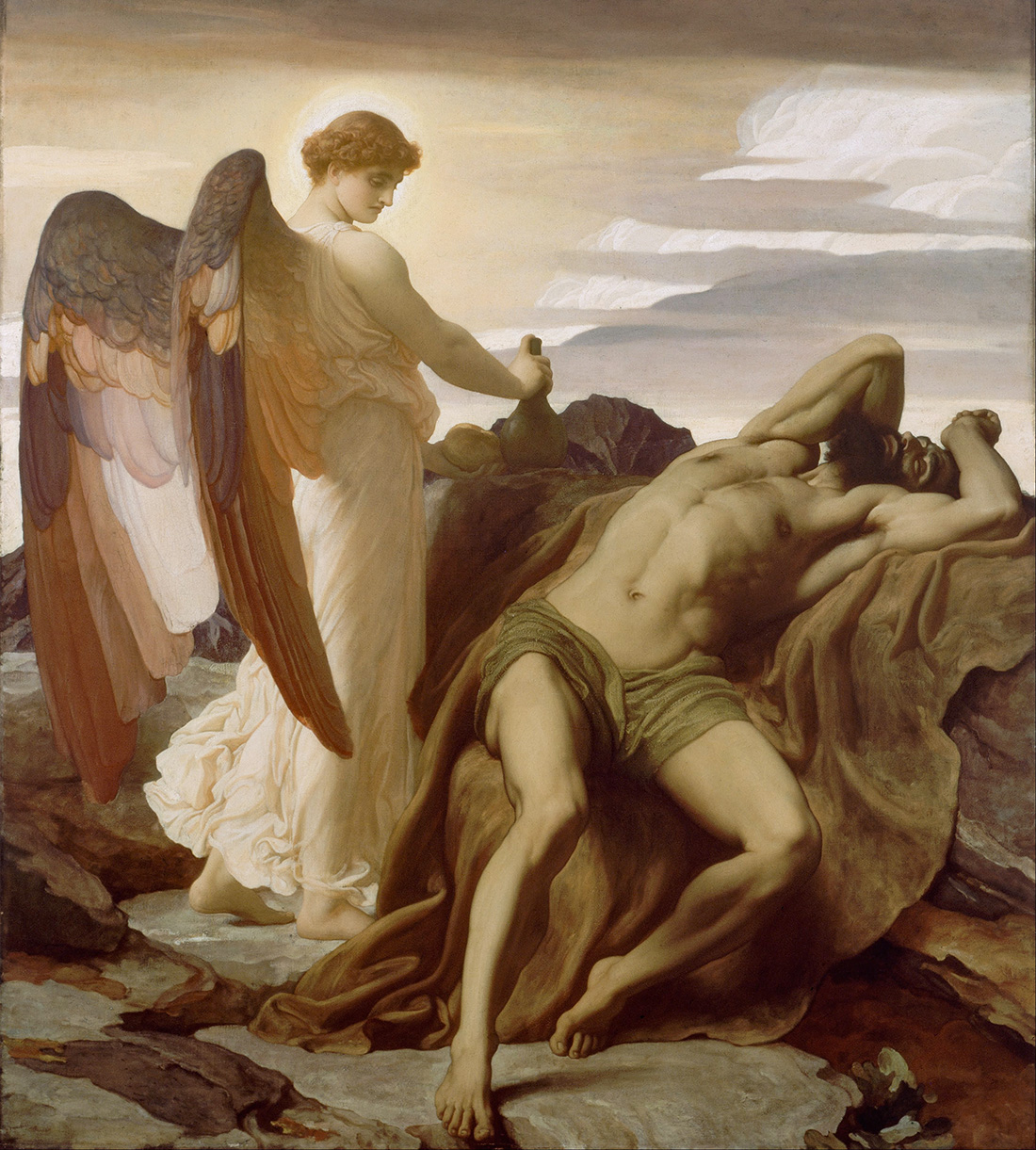Friday of the 10th Week in Ordinary Time: 1 Kings 19: 9a, 11-16, Matthew 5: 27-32.
Today’s readings cap off a week of readings about Elijah and about Christ’s Sermon on the Mount. We explored earlier this week how Elijah’s life in exile harmonizes with Jesus’s lessons in the Beatitudes about the type of person God wants us to be: humble, obedient, and clean of heart. Today’s readings, on the other hand, reveal something about the nature of God Himself.
We join Elijah at the cave where he has hid himself, but it’s not just any cave. This is Mount Horeb, the Mountain of God where Moses was given the Ten Commandments. In all of scriptures, this is the only time we hear of a prophet or other major figure traveling back to Mount Horeb. That’s probably because it’s a heck of a journey southward, into today’s Saudi Arabia, across the Red Sea from Egypt. And why does he go there? We can glean from a few verses prior to today’s reading that God is trying to care for him in his despair. You see, King Ahab tells his wife Jezebel all that Elijah did in slaughtering her prophets to Baal, and she vows to do the same to Elijah the next day. He flees from the northern kingdom of Israel to Beer-Sheba in the southern kingdom of Judah, “and came and sat down under a solitary broom tree. He asked that he might die: ‘It is enough; now, O Lord, take away my life, for I am no better than my ancestors'” (1 Kings 19:4). He has been effectively cast out of his homeland, God’s chosen nation of Israel, and he despairs. He believes himself to be a failure because the nation did not accept him and a new conversion to God.

It’s worth understanding that this scene is a direct reference to a similar occasion long before in Jewish history when Abraham casts out his mistress Hagar and son Ishmael at the insistence of his wife Sarah. Note the similarities: “[Hagar] departed, and wandered about in the wilderness of Beer-sheba. When the water in the skin was gone, she cast the child under one of the bushes. Then she went and sat down opposite him a good way off, about the distance of a bowshot; for she said, ‘Do not let me look on the death of the child.’ And as she sat opposite him, she lifted up her voice and wept.” (Genesis 21:14c-16). We have Beer-sheba, despair, resignation to death, and a broom tree/shrub. Yet in both instances, God sends an angel to console His favored ones. For Hagar: “the angel of God called to Hagar from heaven, and said to her, ‘What troubles you, Hagar? Do not be afraid; for God has heard the voice of the boy where he is. Come, lift up the boy and hold him fast with your hand, for I will make a great nation of him’” (Gen 21:17-18). And for Elijah: “Suddenly an angel touched him and said to him, ‘Get up and eat.’ He looked, and there at his head was a cake baked on hot stones, and a jar of water. He ate and drank, and lay down again. The angel of the Lord came a second time, touched him, and said, ‘Get up and eat, otherwise the journey will be too much for you'” (1 Kings 19:5b-7). (The journey is 40 days and nights to Mount Horeb). The parallels for the Jewish audience hearing this text would be clear, that God shows mercy and favor on his chosen ones, regardless of their state in the world.

This is the background to today’s first reading. We pick up when Jesus’s divine nature, the Word of God, tells him, “Go outside and stand on the mountain before the LORD; the LORD will be passing by.” This is astonishing — only Moses has met God, also here on Mt. Horeb, and he was transfigured by the experience, needing to wear a veil around the Jews because his face glowed so much. And this was from only being in his presence, facing God’s back. No one sees God face-to-face except the Son and those who are called to everlasting life with Him.
What follows is a fascinating series of signs: great wind, an earthquake, and fire. Yet God is not in any of them. This is an important message in a part of scriptures specifically dealing with idolatry. As Elijah points out to Ahab and Jezebel, we must not make statues and images to pray to, but here God shows that He cannot be found or encapsulated by any earthly phenomenon, no matter how great. God’s point is that He is beyond and before any of these things. So, how does He come to Elijah? “After the fire there was a tiny whispering sound. When he heard this, Elijah hid his face in his cloak and went and stood at the entrance of the cave.” A tiny whispering sound! How unexpected, especially in the Old Testament where we are used to hearing about God’s might, how no one can stand to be in His presence, how he slaughters the foes of the Israelites. Even unexpected here in the 1st Book of Kings where God’s fire had just immolated not only the bull offering but also the stones, water and dust; and His judgment upon the prophets of Baal was carried out to the extreme by Elijah.
Elijah recognizes God in that tiny whispering sound and hides his face with the appropriate fear, awe, and reverence due to God. The voice of God asks, “Elijah, why are you here?” Clearly, this is asked for Elijah to vocalize his own despair and failings, to go through confession, as it were. God knows why he is there, after all, God’s angel prepared him for the journey and set him out to Horeb. But Elijah must answer and we hear him give voice to anxieties and personal despair that we feel to this day. “I have been most zealous for the LORD,” he answers, “But the children of Israel have forsaken your covenant.” And he admits: “I alone am left, and they seek to take my life.” The first concern is akin to the problems we have with the Church today, that despite our zeal and devotion to God it seems that the broader Church and world have forsaken His covenant (e.g., sexual abuse scandals, clueless parishioners, shallow faith, divisive politics influencing Christians more than the precepts of faith, etc.). The second concern we experience less literally, especially here in our comfortable Amerian existence, but the feeling is familiar to some: isolation, anxiety, feeling threatened.

God’s response to Elijah is instructive: “Go, take the road back to the desert near Damascus. When you arrive, you shall anoint Hazael as king of Aram. Then you shall anoint Jehu, son of Nimshi, as king of Israel, and Elisha, son of Shaphat of Abel-meholah, as prophet to succeed you.” This no-nonsense instruction to do His will provides the direction and focus that Elijah needs. In this quiet voice, God shows that He cares for Elijah, that he’s not dismissing him, but God’s words also reveal to Elijah that anxiety and self-pity are useless feelings. God is not worried about the state of His people or of His plan on earth — we get the sense that His plan will unfold in due time and the concerns that we might have at any specific moment in time simply reveal how far we are from the divine perspective.
But God does say more. Why it is left out of the lectionary might be another problem of letting contemporary sensibilities edit our experience of scriptures. He adds, “Whoever escapes from the sword of Hazael, Jehu shall kill; and whoever escapes from the sword of Jehu, Elisha shall kill. Yet I will leave seven thousand in Israel, all the knees that have not bowed to Baal, and every mouth that has not kissed him.” This is important because it shows that God cares about human devotion to Him and to the truth. He is telling Elijah that the nation of Israel is not utterly lost, that it will be purged of heresy (so that it can be pure soil for Mary to be born and become the Ark of the New Covenant), and that even though Elijah thinks he’s the last believer left, some 7,000 righteous ones remain, too. Killing heretics doesn’t jive with our sense of earthly justice here in the year 2020, but as I reflected in The Cycle of Salvation, we can see this as God’s prerogative in dealing out divine justice at the time and place He sees fit. It’s not up to us to judge His actions.
It also says something about the uncompromising nature of God. Ours is not a God who can be placed among idols — this applies to Baal and Asherah as well as the idols of money, scientific rationalism, power, prestige, entertainment, and pleasure. Some say that they don’t like this “idea” of God and it doesn’t jive with him being love. After all, love involves a sacrificial quality that is self-giving rather than uncompromising. I respond that perhaps we’re confusing the way God acts toward us with Who he is. God’s uncompromising nature is not an “idea” but a revealed reality. From Genesis through the gospels, God in the form of the Father and the Son reveals to us that there are things that do not bend, things that are uncompromising. Most central here is truth: truth does not change according to circumstance. And when we contemplate God with our very limited minds, the first thing that we must admit is that God is ultimate truth. There are no lies in God. So let’s pay close attention when God establishes the first commandment, “I am the Lord your God, who brought you out of the land of Egypt, out of the house of slavery; you shall have no other gods beforeme. You shall not make for yourself an idol, whether in the form of anything that is in heaven above, or that is on the earth beneath, or that is in the water under the earth. You shall not bow down to them or worship them; for I the Lord your God am a jealous God” (Exodus 20:2-5). He is telling Moses not just that He is ultimate and above other gods, but that His essence — ontologically speaking — is fully complete, and nothing can be added. In other words, when it comes to God, there is simply no other room for another god or idol. This is uncompromising. This is the same uncompromising point He is making with Elijah when He proclaims that all of the Baal worshippers will be killed. It has to do with establishing God’s nature, not other aspects of how we act and sin. Because at the same time we know that He is all-loving and all-forgiving. He acts with us, His beloved, in ways that are the opposite of uncompromising. How many times does He return to the Jews despite their infidelities? How many times does He welcome us back despite our sins and us turning our backs on Him? Infinite times.

So we must have room in our conception of God for both an uncompromising ontological nature and a loving and forgiving performative nature.
Jesus, throughout his ministry but particularly in today’s gospel reading, tries to help us synthesize this truth about God’s nature and realize what it means for our own lives. This is the part of St. Matthew’s account of the Sermon on the Mount when Jesus tackles the question of adultery and human sexuality. It is also an example of how He perfects the law given to the Jews. He begins with the law they know: “You have heard that it was said, You shall not commit adultery.” Then the pivot words that signal how He is perfecting the law: “But I say to you,” followed by his teaching: “everyone who looks at a woman with lust has already committed adultery with her in his heart.”
My first thought: “Woe is me!” How counter-to-culture it is for a “hot-blooded man,” as the cliché goes, to not have a lustful thought when just browsing the news or walking past shop windows. We have glorified the female body (at least one skinny, large-breasted version of it) in our Western culture and at the same time liberalized sexuality as something freeing and freely shared. The result is a constant bombardment of skimpily clad beauties broadcast online, in print, and in person as young women, in particular, seek to come to grips with cultural expectations and still feel good about themselves. It is a difficult situation for women and men alike. Men, while ostensibly the “audience” for the liberalized female form (some might say voyeurs, exploiters, or aggressors here) encounter a serious challenge in Christ’s words today. I’m not even going to talk about porn, but this multi-billion dollar industry is the worst of the offenses to Christian life seen through this lens.
So what’s the solution? Make women cover up like a repressive Islamic state? No! Christ is clear that the problem is internal to the one who lusts, not a problem of the one being lusted after. The solution was clearly stated by St. Paul and countless saints after him: self-control. He writes, “Put to death, therefore, whatever in you is earthly: fornication, impurity, passion, evil desire, and greed (which is idolatry)” (Colossians 3:5). Before we scoff at this, let’s recall that Paul dealt with the problem of taming the passions constantly with his fledgling communities. This was not something he was flippant about. He saw that a new baptism in Christ enables a person to truly be re-born and devote themselves to pure things. But self-control starts with yearning for God and it finds its lasting power in Christ. Without Christ, the whole idea of taming the passions makes no sense to Paul and is truly fruitless. But Christ lifts us to a higher plane. Hear his passion about this point: “Do not lie to one another, seeing that you have stripped off the old self with its practices and have clothed yourselves with the new self, which is being renewed in knowledge according to the image of its creator. In that renewal there is no longer Greek and Jew, circumcised and uncircumcised, barbarian, Scythian, slave and free; but Christ is all and in all!” (Col 3: 9-11). This isn’t a point about multiculturalism. He’s pointing out the radical newness of a life in Christ that unites us and helps us break free from old morés.
Let’s return, then, to Christ, and what exactly He says on this point. He says that looking at a woman with lust is committing adultery in your heart. He perfects the law by changing the notion that it’s simply a set of actions to avoid or to do. He points out that the law is meant to make an internal change, to purify one’s thoughts, heart, and soul. This is so much deeper than just avoiding certain actions. I think of when I used to justify some small sin I committed by saying, “well, at least I didn’t do something really bad.” But this is the wrong mindset. It’s not about weighing relative evil of actions but about avoiding all “occasions of sin” as we say in our Act of Contrition. The “near occasion of sin” is my next thought — will it be one that pleases God or one that is contrary to God? If we truly are re-born in Christ in our baptism, then we receive the gift of full purity given to humanity. While we might never be able to achieve perfection in this life, our goal must be to live up to the gift of the Son that the Father gave to us. We are given scriptures, the Church, the communion of Saints, prayer, miracles, the Holy Spirit active in our lives, the liturgy, the sacraments — all to aid us in this quest.
Christ counters the undoubtedly stunned and disbelieving reaction of His audience (“that’s impossible!” they must have thought) with a few sentences about the continuum of punishments. Cutting off the hand of a thief was an actual thing, as was blinding as a punishment. They represent a certain type of justice (albeit less life-threatening), as does the eschatological judgment of being sent to Gehenna. His point is that He’s serious about His teaching, and the impulse to lust is on the continuum of adultery (like saying “fool” is a form of murder). He wants to draw a clear connection between one’s internal orientation and one’s external actions. He teaches that the internal orientation is just as serious as the external action.

This is not the way secular justice works. Just wanting to kill someone versus actually killing them is the difference between an innocent and a guilty judgment. But not so with God! Let’s sit up and take notice, Christians! We are called to a greater, more uncompromising standard. And here we get to the meat of Jesus’s teaching: as we seek our adoption as sons and daughters of the Father through our baptism in Christ, we are entering a new life with new standards and new realities. As we have explored, God’s nature is uncompromising in that He exists alone. His infinite enormity includes real truth, which cannot be altered or hidden from. As we become sharers in this truth that has been revealed in the laws and commandments of our faith, see just how deeply they have to become a part of our lives! We must assimilate these moral truths down to our core, beyond just our actions, deeper into our motivations and very thoughts. Our very core is meant to be transformed and purified in Christ.
This is what it means to grow in Christ, to unite ourselves with God, to do His will. Every time we say the Our Father, let us remember this as we utter, “Thy will be done, on earth as it is in heaven.” We are saying, “transform my very being, my very thoughts and impulses, just as you do in your existence as purity and truth in heaven.”